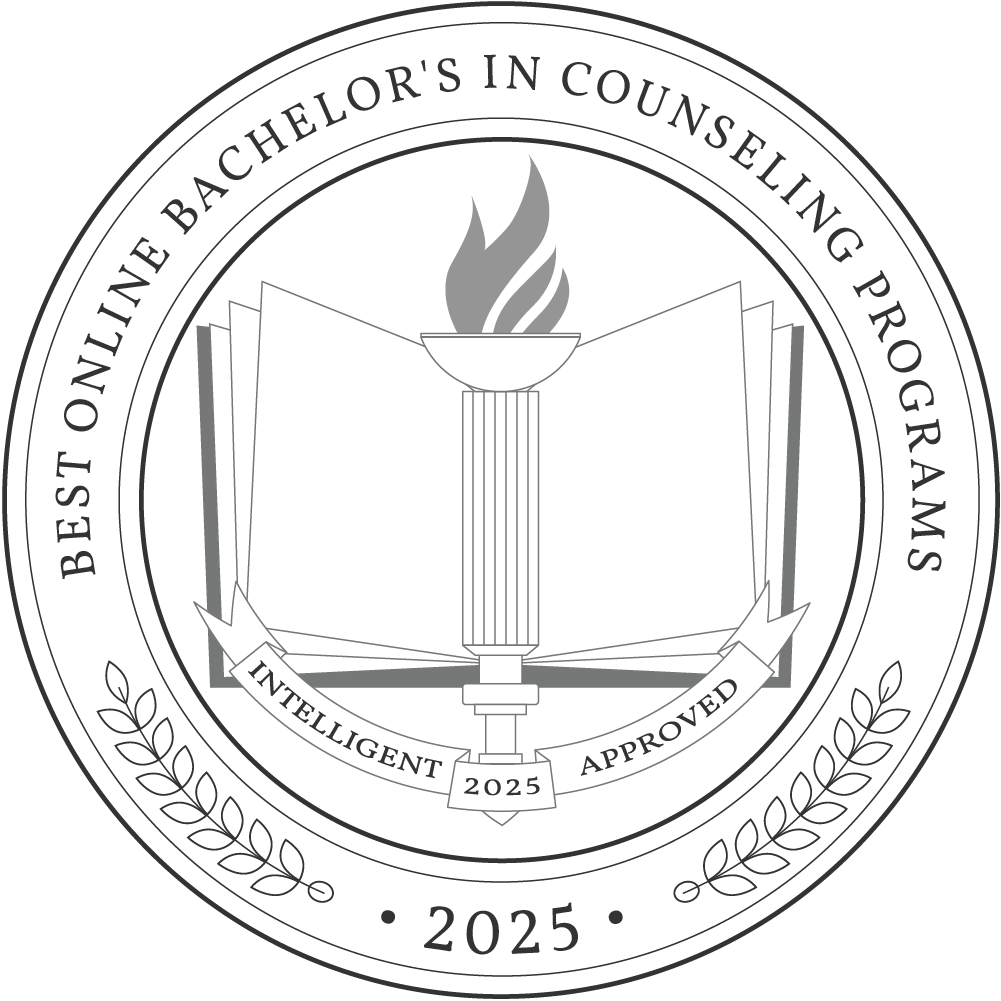Earning an online bachelor’s in counseling is often the perfect choice for students passionate about understanding and assisting others in various life challenges. These programs are ideal for those interested in human behavior and mental health, instilling the eight core counseling competencies: empathy, active listening, ethical practice, self-awareness, and more. With an average cost of $25,910, these four-year programs provide students with the necessary tools to excel in their future counseling careers.
While providing a solid foundation, it’s important to note that counseling is generally a masters-entry field for licensure. Upon graduation from an undergraduate program, counseling students are prepared for roles as Human Resources specialists, case managers, or admissions counselors. Those who continue to graduate school often pursue careers as licensed counselors and earn a median salary of $49,710, with top earners reaching $82,710.
Why Trust Us
The Intelligent.com Higher Education Team is dedicated to providing students with independent, equitable school and program rankings and well-researched resources. Our expert-driven articles cover topics related to online colleges and programs, paying for school, and career outlooks. We use data from the U.S. Department of Education’s College Scorecard, the National Center for Education Statistics, and other reputable educational and professional organizations. Our academic advisory team reviews content and verifies accuracy throughout the year for the most current information. Partnerships do not influence rankings or editorial decisions.
- Analyzed over 2,000 national, accredited, and nonprofit colleges and universities
- 800+ rankings pages are reviewed and updated yearly
- Content is informed by reputable sources, surveys, and interviews with academic advisors and other experts
- Over 100 data points are reviewed for accuracy and quality throughout the year, including sources
How we rank schools
Our list features the best online Counseling degree programs at top colleges nationwide. Each school featured is a nonprofit, accredited institution — either public or private — with a high standard of academic quality for post-secondary institutions.
We evaluated each school’s program on tuition costs, admission, retention and graduation rates, faculty, reputation, and the student resources provided for online students. We collected data from trusted sources like the National Center for Education Statistics, individual school and program websites, school admissions counselors, and other data sources. Then, we calculated the Intelligent Score on a scale of 0 to 100 based on the following criterion:
Academic Quality:
- Admission rate versus enrollment rate
- Retention rate of students who return after year one
- Accreditation status (regional and programmatic)
- Nonprofit status, both private and public institutions
Graduation Rate
- Overall graduation rate
- Total number of currently enrolled students, including diversity metrics
- Student-to-faculty ratio
Cost and ROI
- In-state and out-of-state per-credit tuition rates and fees
- Required credits to graduate
- Earning potential after graduation
- Availability of federal student loans, scholarships, and other financial aid options
Student Resources
- Available student services for online-only and hybrid programs
- On-campus amenities like tutoring centers and the number of libraries
Read more about our ranking methodology.
Best 6 Accredited Online Bachelor’s in Counseling Programs
FiltersInstitution Type
Status
- Intelligent Score
- Alphabetically By University Name
- Acceptance Rate
- Enrollment
- In-state Graduate Tuition
- Out-of-state Graduate Tuition
- In-state Undergraduate Tuition
- Out-of-state Undergraduate Tuition
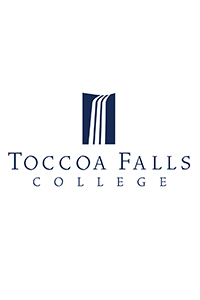
Toccoa Falls College
Intelligent Score: 94.86In-state: $42,920
Out-of-state: $42,920
In-state: $41,700
Out-of-state: $41,700
SAT: 990-1240
ACT: 18-24
$370
Online, On-Campus
Association for Biblical Higher Education Commission
126
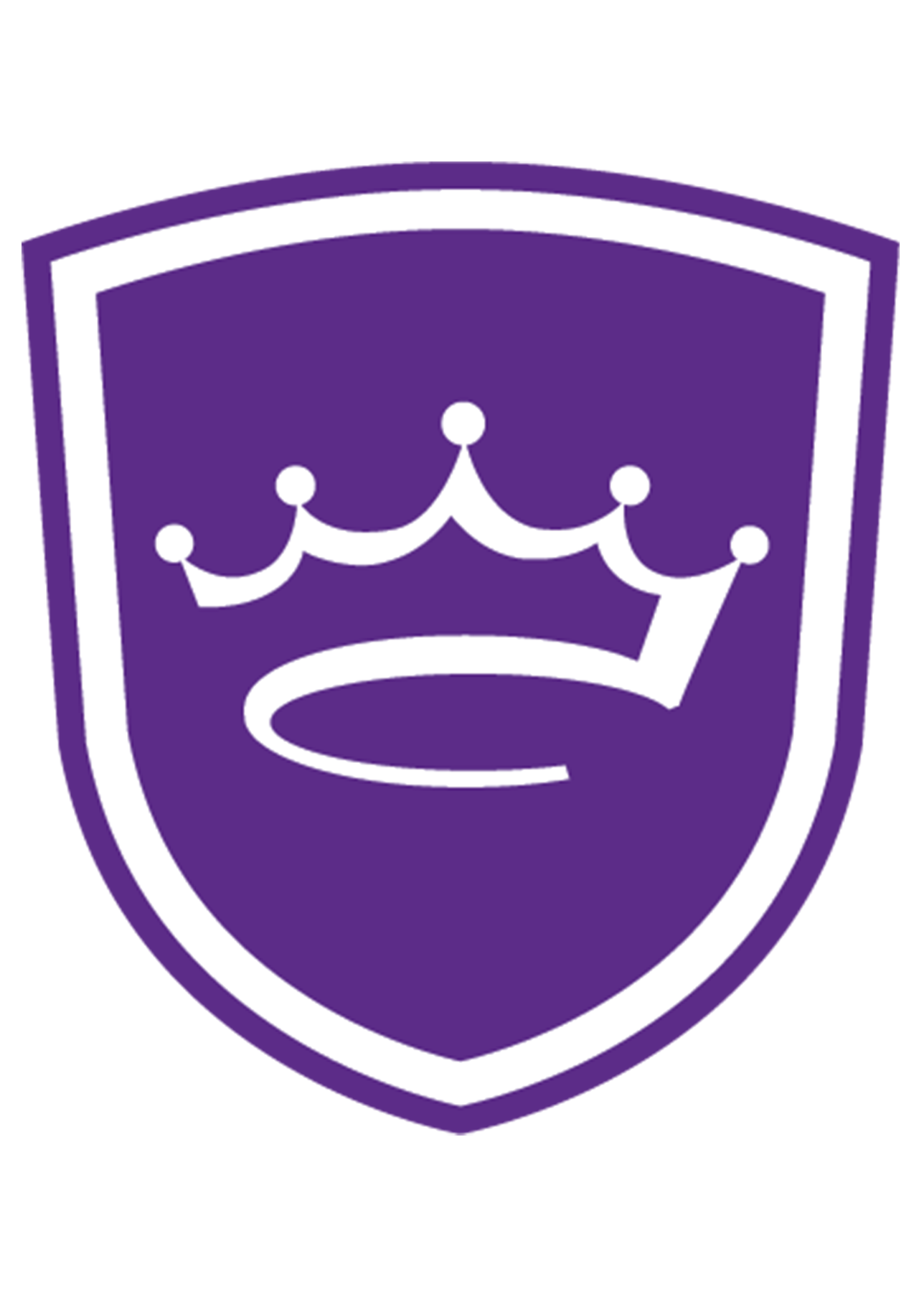
Crown College
Intelligent Score: 94.51In-state: $27,270
Out-of-state: $27,270
In-state: $9,990
Out-of-state: $9,990
SAT: 960-1150
ACT: 18-23
$455
Online
Higher Learning Commission
120
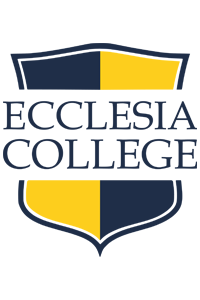
Ecclesia College
Intelligent Score: 92.59In-state: $38,680
Out-of-state: $38,680
In-state: $35,100
Out-of-state: $35,100
SAT: 970-1210
ACT: 18-25
$299
Online
Association for Biblical Higher Education Commission
120
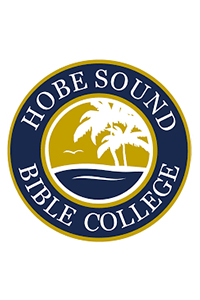
Hobe Sound Bible College
Intelligent Score: 92.31In-state: $18,140
Out-of-state: $18,140
In-state: $22,130
Out-of-state: $22,130
SAT: 840-1200
ACT: 15-25
$240
Online
Association for Biblical Higher Education Commission
129
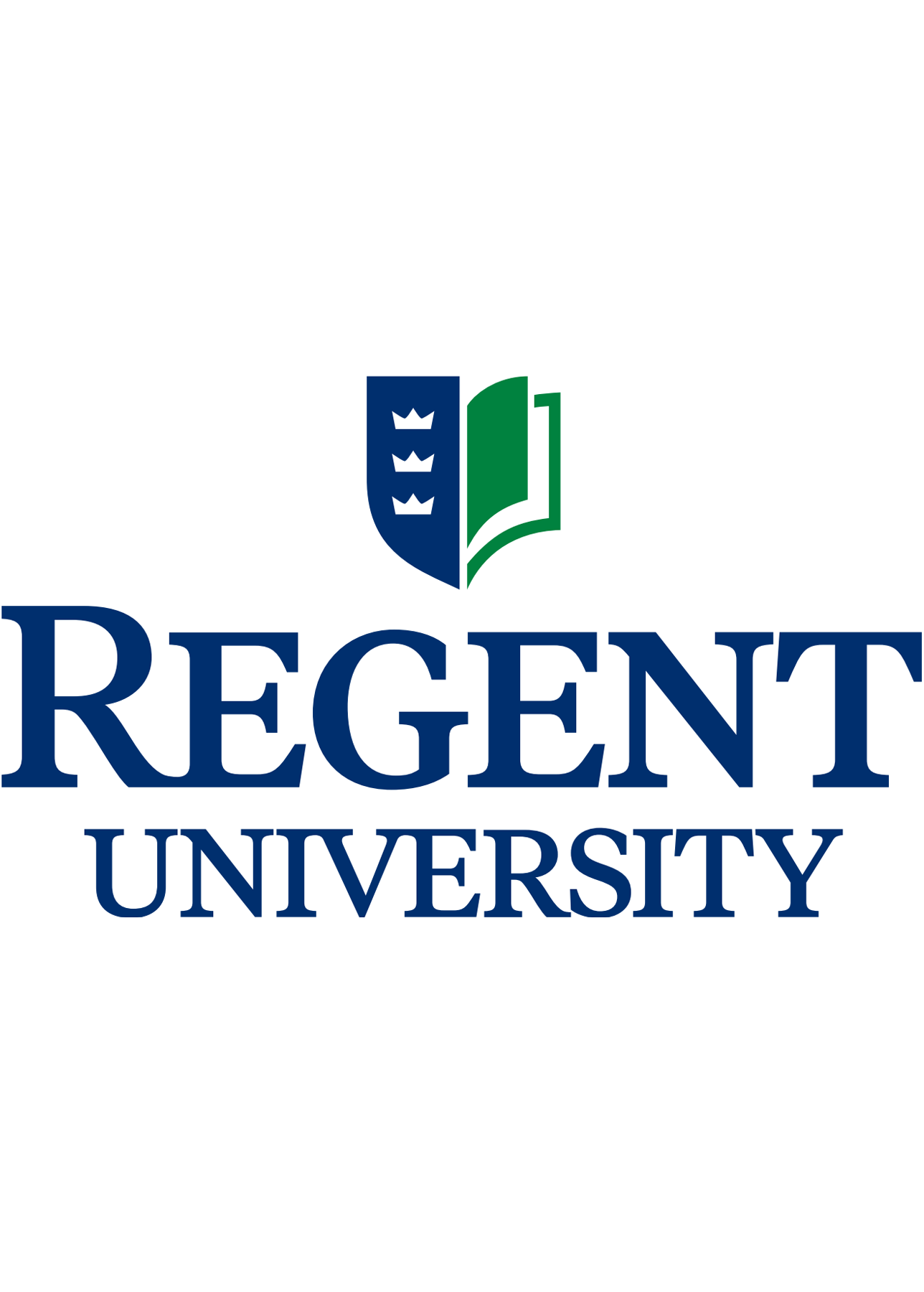
Regent University
Intelligent Score: 92.01In-state: $17,220
Out-of-state: $17,220
In-state: $15,552
Out-of-state: $15,552
SAT: 940-1220
ACT: 21-29
$395
Online, On-Campus
Southern Association of Colleges and Schools Commission on Colleges
120

Arizona State University
Intelligent Score: 91.8In-state: $10,710
Out-of-state: $28,800
In-state: $11,720
Out-of-state: $11,720
SAT: 1100-1320
ACT: 21-28
$634
Online
Higher Learning Commission
120
How to Choose an Online Bachelor’s in Counseling Program
Choose your area of study
Selecting the right area of study, also referred to as specialization, for your bachelor’s in counseling is pivotal, as this decision will shape the foundation for your future education and licensure. It’s essential to consider your interests and career to choose a specialization that aligns best with your professional goals. To illustrate, Clinical Mental Health Counseling is best for those interested in individual or group therapy. School Counseling may work better for those passionate about guiding students, and Substance Abuse Counseling for those drawn to addiction-related issues.
Research schools and programs
Now that you’ve settled on a specialization, you can research schools and programs. First, verify each program’s accreditation status, which is essential for future educational pursuits and eventual licensure. Then, consider the following questions to help guide your research further:
- What is the faculty’s expertise in your chosen specialization?
- Are there virtual support services for online students?
- What is the student-to-faculty ratio in online classes?
- How does the program facilitate networking and collaboration among online students?
- How does the program stay updated on industry trends and evolving counseling practices?
You may benefit from exploring programs offering bachelor-to-master tracks depending on your interests. These integrated paths streamline the journey toward licensure, allowing a seamless transition to advanced studies.
Prepare for tests and applications
Once you’ve identified potential schools, it’s time to prepare for tests and applications. Ensure you meet standard admission requirements, and begin gathering your transcripts, letters of recommendation, and personal statements. Consider enrolling in a test prep course if your chosen school requires SAT or ACT scores. However, it’s crucial to double-check specific requirements, as some institutions may prioritize elements like a compelling personal statement over standardized test scores.
Select your program
If you submit more than one application, it’s possible to receive multiple acceptance letters. In this situation, you may have a significant decision to make. Now is a great time to revisit the initial criteria from your research — identify the programs that stood out, the faculty you’re eager to learn from, and who has strong online student support. Align these insights with the total cost of attendance and available financial aid opportunities.
Taking this holistic approach ensures that you’ll make a well-informed decision that meets your academic and support needs and considers the financial aspects.
Determine how you’ll pay for your degree
Figuring out how to fund your degree may seem daunting, but several resources are available to help. Start by exploring scholarships and grants, prioritizing those directly related to counseling or your chosen specialization. Next, consider federal student aid options, including grants and subsidized or unsubsidized loans. If you’re interested in part-time employment, consider work-study programs for on-campus or community service opportunities. Meanwhile, those currently employed should check with their employer about tuition reimbursement programs — as these can significantly offset educational expenses.
By strategically combining these resources, you can construct a solid financial plan to support your educational pursuits in counseling.
What Can You Expect From an Online Bachelor’s in Counseling Program
An online bachelor’s in counseling program offers an extensive foundation for aspiring counselors, laying the groundwork for further licensure pursuit. Typically completed in four years, the program covers coursework encompassing psychology, human development, and counseling theories. During these courses, students build communication, empathy, and problem-solving skills — essential for creating a thriving counseling practice. Graduates are prepared for many roles in mental health support, but many pursue their graduate degrees to be eligible for state licensure. Most online programs are designed for accessibility and are therefore delivered entirely online, eliminating the need for in-person residencies, though some exceptions exist.
Many students interested in mental health pursue degrees in counseling or psychology. While these disciplines share similarities, such as focusing on understanding human behavior, their approaches and applications diverge. It’s essential to thoroughly research both fields to comprehend the differences and ensure you align your educational choices with your specific career goals.
Potential courses you’ll take in an online bachelor’s in counseling program
- Introduction to Psychology: This foundational course explores the fundamental principles of psychology, introducing students to key concepts such as behavior, cognition, and the biological bases of mental processes. It lays the groundwork for understanding human behavior and sets the stage for more specialized coursework.
- Counseling Theories and Techniques: Students delve into various theoretical approaches to counseling, learning about the principles and application of major counseling theories. This course equips students with a theoretical framework to guide their future counseling practice and provides practical skills for effective therapeutic communication.
- Developmental Psychology: This course examines psychological growth and changes from infancy through old age. Learners gain insights into the cognitive, emotional, and social aspects of human development, improving their understanding of clients across different stages of life.
- Ethics in Counseling: This course addresses ethical considerations and professional standards in counseling and prepares students for the moral challenges they may encounter. It emphasizes the importance of confidentiality, informed consent, and ethical decision-making, ensuring that future counselors adhere to ethical guidelines.
- Abnormal Psychology: This course explores psychological disorders, their classification, and treatment modalities. Students learn to recognize and understand mental health conditions, developing a foundation for later coursework and practical application in counseling settings.
What Can I Do With a Counseling Degree?
Most individuals who earn a bachelor’s degree in counseling go on to work in non-clinical roles, helping individuals or groups cope with mental, emotional, or behavioral health issues. This can include addressing issues like substance misuse, depression, anxiety, trauma, grief, addictions, and more. For individuals to perform clinical roles, such as marriage and family therapists and psychologists, they must earn a master’s degree and obtain a state-issued license. A bachelor’s degree in counseling from an accredited program lays an ideal foundation for this continued study.
According to the Bureau of Labor Statistics (BLS), employment in community and social service occupations is expected to experience faster-than-average growth through 2032. The agency predicts there will be an average of 281,600 new job openings per year over the next decade, with growth driven by the need to replace workers who retire or leave the field and ongoing issues related to substance misuse, homelessness, and anxiety and depression among children, teens, and young adults.
Career outlook
Below are some common jobs for counseling graduates:
- Substance abuse, behavioral disorder and mental health counselors — Advise people on issues relating to alcoholism, addictions, depression, or other mental health challenges and provide support to help individuals recover or manage these issues.
- Median annual salary: $49,710
- Projected employment growth (through 2032): 18%
- New jobs projected: 388,200 per year
- Correctional treatment specialists — Assist in rehabilitating law offenders in custody or on probation or parole by evaluating probationers or parolees to determine rehabilitation plans, connecting them with resources, and developing release plans.
- Median annual salary: $59,860
- Projected employment growth (through 2032): 3%
- New jobs projected: 7,400 per year
- Social and human service assistants — Provide client services, including support for families, in a wide variety of fields, such as psychology, rehabilitation, and social work, and help clients find benefits or community services.
- Median annual salary: $38,520
- Projected employment growth (through 2032): 9%
- New jobs projected: 415,100 per year
Online Bachelor’s in Counseling Degree Frequently Asked Questions
How do I apply to an online bachelor’s in counseling degree program?
To apply for these programs, you’ll want first to assess if you’re considered a first-time enrollee or a transfer student. Typically, completion of prerequisite coursework is required before declaring counseling as a major.
In addition, applicants are often asked for a personal statement highlighting their writing skills and detailing their enthusiasm for counseling. Transcripts and letters of recommendation are commonly requested. While some programs have moved to test-optional policies in recent years, many still require scores from the ACT or SAT. If your schools require these scores, consider enrolling in a test prep program to gain a competitive advantage.
Lastly, don’t hesitate to contact an admissions counselor for further guidance on submitting your application — including getting answers to your questions and more information on program specifics.
How much does an online bachelor’s in counseling degree cost?
For the 2020-2021 academic year, the average tuition at public universities was $19,374, significantly more affordable than the $45,920 average at private colleges. Public schools are often more cost-effective due to state subsidies and government funding.
There are some costs specific to online learning that you should factor into the overall cost of attendance. These will vary by institution, but typically include:
- Virtual learning fees
- Library fees
- Textbooks and course materials
Despite these costs, online learners usually save money by eliminating commuting expenses, room and board, and fees for on-campus facilities — offering a more budget-friendly alternative for anyone seeking flexibility and cost efficiency in pursuing their degree.
How long does it take to earn an online bachelor’s in counseling degree?
While traditional, full-time students often complete these degrees within four years, online programs offer greater flexibility, allowing students to progress at their own pace. The inherent adaptability of online learning caters to individual schedules and commitments, offering students the freedom to tailor their educational journey based on their needs and circumstances. Enrolling part-time can extend the duration, with some students taking additional years to finish.
Moreover, the number of required credits significantly influences program length; generally, more credits means a longer completion timeline.
Is a counseling degree worth it?
A bachelor’s degree in counseling provides necessary preparation for students who want to help vulnerable populations, such as children, the elderly, or individuals coping with trauma or mental health issues. Most counseling jobs require a bachelor’s degree, so this is an essential step for those who want to enter this field. A bachelor’s degree is also a requirement for master’s programs, which will help students prepare for clinical positions if that’s what they aspire to.
From a financial perspective, individuals with a bachelor’s degree earn a median weekly salary of $1,432, compared to $935 for students without a college degree. Mental health counselors earn a median annual salary of $49,210, although the top 10 percent of earners in the field make more than $82,000 per year.
Other Bachelor’s in Counseling Programs
Compare School Options
Related Degrees
- Christian Counseling
- Human and Family Development
- BCBA Master's Programs
- Psychology
- Counseling
- Educational Psychology
- Substance Abuse Counseling
- Organizational Psychology
- Addictions and Recovery
- Behavioral Psychology
